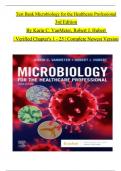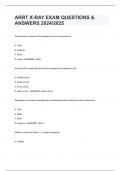Test Bank Microbiology for the Healthcare Professional
3rd Edition
By Karin C. VanMeter, Robert J. Hubert
| Verified Chapter's 1 - 25 | Complete Newest Version
,Table of content
1. Scope of microbiology
2. Chemistry of life
3. Cell structure and function
4. Bacteria and archaea
5. Viruses
6. Eukaryotic microorganisms
7. Physical and chemical methods of control
8. Microbiological laboratory techniques
9. Microbiological laboratory safety issues
10. Pharmacology
11. Antimicrobial drugs
12. Infection and disease
13. The immune response and lymphatic system
14. Infections of the integumentary system, soft tissue, and musculoskeletal system
15. Infections of the respiratory system
16. Infections of the gastrointestinal system
17. Infections of the nervous system and sensory structures
18. Infections of the cardiovascular and circulatory systems
19. Infections of the urinary system
20. Infections of the reproductive system
21. Sexually transmitted infections and diseases
22. Human age and microorganisms
23. Microorganisms in the environment and effects on human health
24. Emerging infectious diseases
25. Biotechnology
,Chapter 01: Scope of Microbiology
VanMeter: Microbiology for the Healthcare Professional, 3rd Edition
MULTIPLE CHOICE
1. In the sixteenth century a father-and-son team, by the name of , produced
a compound microscope consisting of a simple tube with lenses at each end.
a.
van Leeuwenhoek
b.
Semmelweis
c.
Janssen
d.
Hooke
ANS: C REF: p. 3
2. “Animalcules” were first described by
a.
Robert Hooke.
b.
Antony van Leeuwenhoek.
c.
Hans Janssen.
d.
John Needham.
ANS: B REF: p. 3
3. Micrographia, a publication illustrating insects, sponges, as well as plant cells, was
published by
a.
Robert Hooke.
b.
Antony van Leeuwenhoek.
c.
Hans Janssen.
d.
John Needham.
ANS: A REF: p. 3
4. Low-power microscopes designed for observing fairly large objects such as insects or
worms are
a.
electron microscopes.
b.
dark-field microscopes.
c.
fluorescence microscopes.
d.
stereomicroscopes.
ANS: D REF: p. 5
5. A microscope that provides a three-dimensional image of a specimen is a
a.
dark-field microscope.
b.
transmission electron microscope.
c.
bright-field microscope.
d.
scanning electron microscope.
ANS: D REF: p. 7
6. The tool of choice to observe living microorganisms is the
a.
bright-field microscope.
b.
phase-contrast microscope.
, c.
fluorescence microscope.
d.
electron microscope.
ANS: B REF: p. 6
7. Which scientist is most responsible for ending the controversy about spontaneous generation?
a.
John Needham
b.
Joseph Lister
c.
Louis Pasteur
d.
Robert Koch
ANS: C REF: p. 8
8. Fossils of prokaryotes go back billion years.
a. 4.0 to 5.0
b. 3.5 to 4.0
c. 2.5 to 3.0
d. 2.2 to 2.7
ANS: B REF: p. 9
9. Molds belong to which of the following groups of eukaryotic organisms?
a.
Protozoans
b.
Archaea
c.
Fungi
d.
Algae
ANS: C REF: p. 11
10. The correct descending order of taxonomic categories is
a.
species, domain, phylum, kingdom, order, division, class, genus.
b.
domain, kingdom, phylum, class, family, order, genus, species.
c.
domain, kingdom, phylum, class, order, family, genus, species.
d.
kingdom, domain, phylum, order, class, family, genus, species.
ANS: C REF: p. 10
11. Complex communities of microorganisms on surfaces are called
a.
colonies.
b.
biofilms.
c.
biospheres.
d.
flora.
ANS: B REF: p. 12
12. A relationship between organisms in which the waste product of one provides nutrients
for another is called
a.
mutualism.
b.
competition.
c.
synergism.
d.
commensalism.
ANS: D REF: p. 12
, Microbiology for the Healthcare Professional 2nd Edition VanMeter Test Bank
13. Which of the following sites of the human body does not have a normal flora?
a.
Intestine
b.
Skin
c.
Vagina
d.
Blood
ANS: D REF: p. 12
14. Which of the following lack nucleic acids?
a.
Archaea
b.
Viruses
c.
Prions
d.
Bacteria
ANS: C REF: p. 11
15. The binominal system of nomenclature was originally developed by
a.
Pasteur.
b.
Linnaeus.
c.
Martini.
d.
Jenner.
ANS: B REF: p. 11
16. Which of the following scientists performed the first vaccination against smallpox?
a.
Pasteur
b.
Jenner
c.
Semmelweis
d.
Koch
ANS: B REF: p. 9
17. Which of the following diseases is generally caused by contaminated food?
a.
Mumps
b.
Shigellosis
c.
Legionellosis
d.
Tuberculosis
ANS: B REF: p. 13
18. Which of the following diseases is transmitted via aerosols?
a.
Psittacosis
b.
Shigellosis
c.
Leptospirosis
d.
Giardiasis
ANS: A REF: p. 14
19. Which of the following organisms is used in the production of cheese?
a.
Propionibacterium shermanii
b.
Acetobacter aceti
c.
Giardia
, Microbiology for the Healthcare Professional 2nd Edition VanMeter Test Bank
d.
Fusobacterium
ANS: A REF: p. 14
20. Which of the following scientists discovered the antibiotic properties of Penicillium?
a.
Alexander Fleming
b.
Louis Pasteur
c.
Joseph Lister
d.
Edward Jenner
ANS: A REF: p. 15
COMPLETION
1. In a compound light microscope the lens closest to the eye is the lens.
ANS: ocular
REF: p. 3
2. The total magnification of an object viewed with a compound microscope with an ocular
lens of 10 and an objective lens of 40 is .
ANS: 400
REF: p. 4
3. Another term for spontaneouNs gUeRneSraItiNonGiTs B.COM .
ANS: abiogenesis
REF: p. 7
4. Microorganisms of various species are often organized into complex communities on
a surface and are called .
ANS: biofilms
REF: p. 12
5. All bacteria are cells.
ANS: prokaryotic
REF: p. 10
6. Cells that contain a nucleus are cells.
ANS: eukaryotic
REF: p. 10
, Microbiology for the Healthcare Professional 2nd Edition VanMeter Test Bank
7. The taxonomic resource for information on bacteria is .
ANS: Bergey’s Manual of Systematic Bacteriology
REF: p. 11
8. A relationship in which two organisms benefit is referred to as .
ANS: mutualism
REF: p. 12
9. The proteins implicated in spongiform encephalopathy are .
ANS: prions
REF: p. 11
10. The cleanup of various industrial wastes by living organisms is referred to as .
ANS: bioremediation
REF: p. 15
MATCHING
Match the description below with the co rrec t i te m f rom this list.
NU SR NI T G OB . C M
a.
Observing insects
b.
Three-dimensional images
c.
Cytoplasmic streaming
d.
Fluorescent dye
e.
Ultrathin sectioned specimens
1. Scanning electron microscope
2. Phase-contrast microscope
3. Transmission electron microscope
4. Stereomicroscope
1. ANS: B REF: p. 7
2. ANS: C REF: p. 6
3. ANS: E REF: p. 7
4. ANS: A REF: p. 5
Match the description below to the correct name from this list.
a.
Robert Koch
b.
Edward Jenner
c.
Louis Pasteur
d.
John Needham
e.
Joseph Lister
f.
Antony van Leeuwenhoek
, Microbiology for the Healthcare Professional 2nd Edition VanMeter Test Bank
5. Animalcules
6. Vaccination
7. Aseptic technique
8. Germ theory of disease
5. ANS: F REF: p. 7 | p. 8
6. ANS: B REF: p. 9
7. ANS: E REF: p. 9
8. ANS: C REF: p. 8
NURSINGTB.COM
, Microbiology for the Healthcare Professional 2nd Edition VanMeter Test Bank
Chapter 02: Chemistry of Life
VanMeter: Microbiology for the Healthcare Professional, 3rd Edition
MULTIPLE CHOICE
1. The atomic number equals the number of
a.
protons.
b.
neutrons.
c.
electrons.
d.
protons and neutrons.
ANS: A REF: p. 20
2. The atomic weight is equal to the sum of
a.
neutrons.
b.
protons and neutrons.
c.
neutrons and electrons.
d.
electrons.
ANS: B REF: p. 20
3. The smallest units of matter are
a.
molecules.
b.
atoms.
c.
protons.
d.
compounds.
N R SI NG TB.CO M
ANS: B REF: p. 20U
4. Protons are
a.
located in the shells.
b.
part of the atomic nucleus.
c.
negatively charged.
d.
uncharged particles.
ANS: B REF: p. 20
5. Particles of an atom located in the outermost shell and available for chemical bonding
are called
a.
valence electrons.
b.
isotopes.
c.
excess electrons.
d.
neutrons.
ANS: A REF: p. 21
6. Isotopes are atoms with
a.
the same number of electrons and protons.
b.
different numbers of protons and electrons.
c.
the same numbers of protons but a different number of neutrons.
d.
different numbers of electrons.
, Microbiology for the Healthcare Professional 2nd Edition VanMeter Test Bank
ANS: C REF: p. 21
7. A chemical bond in which electrons are equally shared is a(n)
a.
ionic bond.
b.
polar covalent bond.
c.
nonpolar covalent bond.
d.
hydrogen bond.
ANS: C REF: p. 23
8. The transfer of electrons in a chemical bond represents a(n)
a.
ionic bond.
b.
polar covalent bond.
c.
nonpolar covalent bond.
d.
hydrogen bond.
ANS: A REF: p. 24
9. The bond of oxygen and hydrogen between water molecules is a(n)
a.
ionic bond.
b.
polar covalent bond.
c.
nonpolar covalent bond.
d.
hydrogen bond.
ANS: D REF: p. 24
10. The isotope deuterium has
a.
one proton. NURSINGTB.COM
b.
one proton and one neutron.
c.
one proton and two neutrons.
d.
one proton and three neutrons.
ANS: B REF: p. 21
11. After filling the first shell, the outermost shell of an atom can hold up to
electrons.
a.
2
b.
6
c.
8
d.
10
ANS: C REF: p. 23
12. The bond between sodium and chlorine atoms in sodium chloride is a(n)
a.
hydrogen bond.
b.
ionic bond.
c.
polar covalent bond.
d.
nonpolar covalent bond.
ANS: B REF: p. 24
13. Sucrose is composed of





